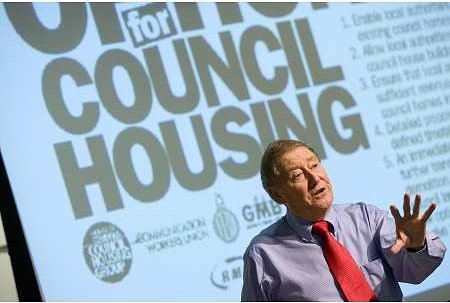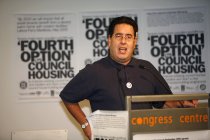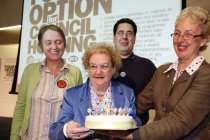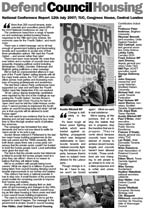 More than 200 council tenants, councillors, trade union delegates joined housing professionals, academics and MPs
attending the DCH national conference at TUC Congress House in London on July 12, 2007.
More than 200 council tenants, councillors, trade union delegates joined housing professionals, academics and MPs
attending the DCH national conference at TUC Congress House in London on July 12, 2007.
 Download two-sided A4 summary report,
read policy statement
and selected extracts from platform speakers below. We are hoping to transcribe the other speakers a.s.a.p (when we've drawn breath)
Download two-sided A4 summary report,
read policy statement
and selected extracts from platform speakers below. We are hoping to transcribe the other speakers a.s.a.p (when we've drawn breath)
|
 Austin Mitchell MP, House of Commons Council Housing group chair, opened the conference
Austin Mitchell MP, House of Commons Council Housing group chair, opened the conference
I've never felt so optimistic about getting what we've been fighting for because change is definitely in the air…
 It's been tough all these years fighting ballots which were loaded against us; fighting propaganda which was designed deliberately to bamboozle tenants and mislead councils; fighting the divisions in our party, because there's been no subject more divisive for the Labour party…
It's been tough all these years fighting ballots which were loaded against us; fighting propaganda which was designed deliberately to bamboozle tenants and mislead councils; fighting the divisions in our party, because there's been no subject more divisive for the Labour party…
 Though change is in the air, I have to say, we won't be fooled again! What we want is real substance….
Though change is in the air, I have to say, we won't be fooled again! What we want is real substance….
 We're saying, at this juncture, first of all, stop the ballots that are in progress; stop the transfers that are in progess. Those transfers, those ballots, have been decided on a different set of financial conditions to those that will now apply when councils are allowed to build. They've come about because councils have been starved of money to achieve decent homes targets and councils haven't been allowed to build. That's persuaded some councils to opt for large scale voluntary transfers, some tenants to vote for them. Those conditions are now changing; to ask people to go ahead is to vote on a false prospectus and is unfair and unreasonable."
We're saying, at this juncture, first of all, stop the ballots that are in progress; stop the transfers that are in progess. Those transfers, those ballots, have been decided on a different set of financial conditions to those that will now apply when councils are allowed to build. They've come about because councils have been starved of money to achieve decent homes targets and councils haven't been allowed to build. That's persuaded some councils to opt for large scale voluntary transfers, some tenants to vote for them. Those conditions are now changing; to ask people to go ahead is to vote on a false prospectus and is unfair and unreasonable."
|
 Jack Dromey, Unite-T&G deputy general secretary, reported on the progress of the Labour Party NEC working group (set up to address the terms of the 2005 Labour Party conference decision) and discussions with Ministers ahead of the housing Green Paper.
Jack Dromey, Unite-T&G deputy general secretary, reported on the progress of the Labour Party NEC working group (set up to address the terms of the 2005 Labour Party conference decision) and discussions with Ministers ahead of the housing Green Paper.
 "Post-war governments built millions of council homes. As the troops returned from the fight against fascism, to blitzed communities, the promise was "homes fit for heroes, homes for all and no return to the 1930's". We've come a long way since those days. But once again, in the 21st century, there's a housing crisis. There are millions who are struggling to buy or rent homes. 1.6 million on council waiting lists, Shelter estimating that that will go up on current trends to 2 million.
"Post-war governments built millions of council homes. As the troops returned from the fight against fascism, to blitzed communities, the promise was "homes fit for heroes, homes for all and no return to the 1930's". We've come a long way since those days. But once again, in the 21st century, there's a housing crisis. There are millions who are struggling to buy or rent homes. 1.6 million on council waiting lists, Shelter estimating that that will go up on current trends to 2 million.

 And that's why, as tenants, trade unionists, together we've campaigned to change government policy. And to say the least there's been some robust exchanges over the last three and four years. Two out of the last three years I actually moved the motions at party conference demanding a change of course, and it was in September then of last year that a working party was established, for dialogue to commence between the government and the party, between the government and the trade unions around a change of course.
And that's why, as tenants, trade unionists, together we've campaigned to change government policy. And to say the least there's been some robust exchanges over the last three and four years. Two out of the last three years I actually moved the motions at party conference demanding a change of course, and it was in September then of last year that a working party was established, for dialogue to commence between the government and the party, between the government and the trade unions around a change of course.
 And what we wanted was simply this. A recognition that decent housing is a human right. At a price that people can afford; well maintained homes with the tenants who live in them having a real say over the running of their estates. Arguing therefore that what we needed was millions for millions. Millions of new homes on the one hand, for the millions who desperately need those homes on the other. And arguing that the crazy bias of the last 10 and 20 years against councils had to end. That to meet housing need in Britain, councils should be centre stage. Councils won't be the only providers - but councils need to return to centre stage. Councils building new homes on the one hand; and tenants - ending the obscenity, on the other hand, of saying to tenants - that if you want badly needed work to be done, then you have to transfer to the private sector.
And what we wanted was simply this. A recognition that decent housing is a human right. At a price that people can afford; well maintained homes with the tenants who live in them having a real say over the running of their estates. Arguing therefore that what we needed was millions for millions. Millions of new homes on the one hand, for the millions who desperately need those homes on the other. And arguing that the crazy bias of the last 10 and 20 years against councils had to end. That to meet housing need in Britain, councils should be centre stage. Councils won't be the only providers - but councils need to return to centre stage. Councils building new homes on the one hand; and tenants - ending the obscenity, on the other hand, of saying to tenants - that if you want badly needed work to be done, then you have to transfer to the private sector.

 Now I think Austin is absolutely right when he says that those years of campaigning has seen welcome progress made. The government has listened to the party, to tenants, and to those in need. And I warmly welcome the fact that housing has now gone right to the top of the political agenda. Indeed at the Manchester conference when the new leadership of the party was elected, the loudest cheer Gordon Brown got was when he said precisely that - housing back to the top of the agenda and councils - and the audience erupted when he said that - and councils once again centre stage.
Now I think Austin is absolutely right when he says that those years of campaigning has seen welcome progress made. The government has listened to the party, to tenants, and to those in need. And I warmly welcome the fact that housing has now gone right to the top of the political agenda. Indeed at the Manchester conference when the new leadership of the party was elected, the loudest cheer Gordon Brown got was when he said precisely that - housing back to the top of the agenda and councils - and the audience erupted when he said that - and councils once again centre stage.
 Yesterday saw, again as Austin has said, some welcome announcements. There's 3 bills and a commitment to 3 million new homes by 2020. Including crucially councils once again being able to build new homes. Its an irony isn't that when I grew up, Labour and Conservative governments used to vie with one another as to who could build the most homes. It was Harold McMillan who boasted one year of having built 300,000 new homes. Once again we want to see massive council house building on that scale. A green paper will now be published, next week… the devil will be in the detail. And there will be crucial issues therefore that we will need to press, and win.
Yesterday saw, again as Austin has said, some welcome announcements. There's 3 bills and a commitment to 3 million new homes by 2020. Including crucially councils once again being able to build new homes. Its an irony isn't that when I grew up, Labour and Conservative governments used to vie with one another as to who could build the most homes. It was Harold McMillan who boasted one year of having built 300,000 new homes. Once again we want to see massive council house building on that scale. A green paper will now be published, next week… the devil will be in the detail. And there will be crucial issues therefore that we will need to press, and win.

 One, investment by government on a massive scale.
One, investment by government on a massive scale.
 Two, councils being able in addition, to borrow; relaxing the treasury rules. I've argued throughout the battles that we've fought over the last 10 years, and maybe my Catholic education lets me down, but as I remember it, when Moses came down from the mountain with the tablets of stone, written on the tablets of stone were not the treasury rules. The treasury rules are the manufature of man and minister, not the law of God. And the treasury rules should therefore change, with councils being able to borrow.
Two, councils being able in addition, to borrow; relaxing the treasury rules. I've argued throughout the battles that we've fought over the last 10 years, and maybe my Catholic education lets me down, but as I remember it, when Moses came down from the mountain with the tablets of stone, written on the tablets of stone were not the treasury rules. The treasury rules are the manufature of man and minister, not the law of God. And the treasury rules should therefore change, with councils being able to borrow.
 Third, we want for tenants an equality of access to public funds for their housing to be maintained and renovated. Ending therefore the gun being pointed to the head with tenants being told, effectively, transfer or else.
Third, we want for tenants an equality of access to public funds for their housing to be maintained and renovated. Ending therefore the gun being pointed to the head with tenants being told, effectively, transfer or else.
 And fourth, the emphasis should not simply be on helping those who wish to buy to buy. The major emphasis must be on social housing, council housing, housing for rent…"
And fourth, the emphasis should not simply be on helping those who wish to buy to buy. The major emphasis must be on social housing, council housing, housing for rent…"
|
 Margaret Wilkinson is a council tenant and a Labour Councillor and Executive Member for Housing in Vale of Glamorgan
Margaret Wilkinson is a council tenant and a Labour Councillor and Executive Member for Housing in Vale of Glamorgan
"Why am I here? Why are you here? Because we believe in council houses. No-one is going to tell us who's the best landlord. The best landlord is the council. They've looked after you for a long time.
 But who's looked after the council? The tenants. They've been loyal to the council. They've been council tenants a long time, certain people. They've paid their rent; for a long time. They're entitled to be given decent homes. They were loyal to the council; and they're still loyal, even though they're fighting for their homes. Where's the loyalty back? They're entitled to loyalty!
But who's looked after the council? The tenants. They've been loyal to the council. They've been council tenants a long time, certain people. They've paid their rent; for a long time. They're entitled to be given decent homes. They were loyal to the council; and they're still loyal, even though they're fighting for their homes. Where's the loyalty back? They're entitled to loyalty!
 Hazel Blears, Gordon Brown - thank you very much, for letting us build some council houses! Its very nice of you. Its about time! But don't let us build them, and them ask us to give them away. We have to stop this vote. This voting is not right. We're entitled to fairness. We're entitled to the fourth option, to bring our houses up to standard. We're entitled to build council houses.
Hazel Blears, Gordon Brown - thank you very much, for letting us build some council houses! Its very nice of you. Its about time! But don't let us build them, and them ask us to give them away. We have to stop this vote. This voting is not right. We're entitled to fairness. We're entitled to the fourth option, to bring our houses up to standard. We're entitled to build council houses.
 I am a council tenant in the Vale of Glamorgan. I'm a county councillor, with a portfolio for the housing. I am the only council tenant on that council out of 48 councillors. And I will fight to keep my homes in, they will not be going out to any private landlord at all.
I am a council tenant in the Vale of Glamorgan. I'm a county councillor, with a portfolio for the housing. I am the only council tenant on that council out of 48 councillors. And I will fight to keep my homes in, they will not be going out to any private landlord at all.
 I believe it's about time my government is listening to us. The council tenants are labour supporters, and if they haven't got the message yet it's about time they did. If they don't invest in council houses, and allow us to build more - but I don't want them to allow us to build with private landlords and put us in a corner out of the way where you can't see us! I want to be in the middle. I want to be proud of being a council tenant and I'm sure you all are. And I believe that this government if they don't start listening to us they're going to lose the next election, because we are their voters!
I believe it's about time my government is listening to us. The council tenants are labour supporters, and if they haven't got the message yet it's about time they did. If they don't invest in council houses, and allow us to build more - but I don't want them to allow us to build with private landlords and put us in a corner out of the way where you can't see us! I want to be in the middle. I want to be proud of being a council tenant and I'm sure you all are. And I believe that this government if they don't start listening to us they're going to lose the next election, because we are their voters!
 I believe wherever you go, when you go to council meetings, you go to council surgeries, you go to your MP's surgeries, you write to them, write to Tony Blair - it's too late to write to him now - but write to Hazel, write to Gordon Brown, write to the Housing Minister - but put one of these in the letters as well [holding up a DCH 'Hands Up for Council Housing' hand]. Let them know we are proud of being council tenants, and we're staying council tenants, and don't let any anyone else tell us not to! Please, get out and vote for what we're entitled to, and what is legally our homes.
I believe wherever you go, when you go to council meetings, you go to council surgeries, you go to your MP's surgeries, you write to them, write to Tony Blair - it's too late to write to him now - but write to Hazel, write to Gordon Brown, write to the Housing Minister - but put one of these in the letters as well [holding up a DCH 'Hands Up for Council Housing' hand]. Let them know we are proud of being council tenants, and we're staying council tenants, and don't let any anyone else tell us not to! Please, get out and vote for what we're entitled to, and what is legally our homes.
|
 Frank Dobson MP represents Camden where tenants have rejected transfer, PFI and ALMO
"While I was leader of Camden council we bought up from the private sector 4,500 flats. Most of them were occupied, and we did it to give the people living in them security of tenure. And I don't mean just people living in hovels - some of them were living in mansion flats overlooking Hampstead Heath, and none of them objected to becoming council tenants either. And I think behind a lot of this stuff on council tenancies these days is a sort of disparagement of the idea of anybody being a council tenant, and that somehow or other you're inferior if you are, and we've got to get away from that as well."
Frank Dobson MP represents Camden where tenants have rejected transfer, PFI and ALMO
"While I was leader of Camden council we bought up from the private sector 4,500 flats. Most of them were occupied, and we did it to give the people living in them security of tenure. And I don't mean just people living in hovels - some of them were living in mansion flats overlooking Hampstead Heath, and none of them objected to becoming council tenants either. And I think behind a lot of this stuff on council tenancies these days is a sort of disparagement of the idea of anybody being a council tenant, and that somehow or other you're inferior if you are, and we've got to get away from that as well."
 "as the government is now committed to saying that local people should have their say - then it's quite clear, here in Camden, that if 77% of the tenants, 77% of the leaseholders, and 74% of the people living in the tenant managed estates voted against an ALMO, then the government should accept the decision, it's as simple as that."
"as the government is now committed to saying that local people should have their say - then it's quite clear, here in Camden, that if 77% of the tenants, 77% of the leaseholders, and 74% of the people living in the tenant managed estates voted against an ALMO, then the government should accept the decision, it's as simple as that."
 The first step on any rational housing ladder is someone getting somewhere decent to live…with large numbers living in poor conditions there is only one answer: build some more council houses and do up the ones we've got'
The first step on any rational housing ladder is someone getting somewhere decent to live…with large numbers living in poor conditions there is only one answer: build some more council houses and do up the ones we've got'
 It is ok under Treasury rules if you shift our homes to a housing association, you can write off debt - so why not for council housing?
It is ok under Treasury rules if you shift our homes to a housing association, you can write off debt - so why not for council housing?
|
 Professor Peter Ambrose has carried out key research on the impact of housing costs and conditions
"Thank you friends. Well I'll try and produce a rational analysis but I actually feel quite emotional about this as well.
Professor Peter Ambrose has carried out key research on the impact of housing costs and conditions
"Thank you friends. Well I'll try and produce a rational analysis but I actually feel quite emotional about this as well.
 So I'm going to run through in a very short time, my analysis of what's gone wrong, why it's unaffordable, because unless we've got that, we're not sure what to do about it. And I'm pretty convinced the government isn't sure what to do about it. So the talk is about - Why do we have a problem? What is it costing us? - which is a question which isn't asked very much. And what to do? - which is a question which is asked a lot.
So I'm going to run through in a very short time, my analysis of what's gone wrong, why it's unaffordable, because unless we've got that, we're not sure what to do about it. And I'm pretty convinced the government isn't sure what to do about it. So the talk is about - Why do we have a problem? What is it costing us? - which is a question which isn't asked very much. And what to do? - which is a question which is asked a lot.
 Going back just a little bit in time, the roots of the problem as I see it lie in the 1970s bail-out of sterling, which had the effect of cutting a lot of public-sector spending, including of course capital intensive spending, because with housing of course you've got to have the money up front, it's not a revenue service.
Going back just a little bit in time, the roots of the problem as I see it lie in the 1970s bail-out of sterling, which had the effect of cutting a lot of public-sector spending, including of course capital intensive spending, because with housing of course you've got to have the money up front, it's not a revenue service.
 Secondly, and this is really important too, the set of deregulations, various Acts passed in the 80s under Mrs Thatcher, which had the effect of freeing up the activities of the whole finance sector and leading to immense competition in that sector; which of course is an extraordinarily powerful sector.
Secondly, and this is really important too, the set of deregulations, various Acts passed in the 80s under Mrs Thatcher, which had the effect of freeing up the activities of the whole finance sector and leading to immense competition in that sector; which of course is an extraordinarily powerful sector.
 So the long term investment in housing has fallen drastically… its now down to 2.9% of total economy which is the second lowest in the developed countries of the OECD. And as a share of government spending it's fallen from 6.1% only 20 odd years ago, to 1.6 % in 2005. A drastic fall in emphasis on spending on housing. Which of course we welcome is now being addressed and looked at seriously. And investment in social housing in particular is down from £13 billion in 1980 to nearly half that in 2005, allowing for inflation, that's in real terms.
So the long term investment in housing has fallen drastically… its now down to 2.9% of total economy which is the second lowest in the developed countries of the OECD. And as a share of government spending it's fallen from 6.1% only 20 odd years ago, to 1.6 % in 2005. A drastic fall in emphasis on spending on housing. Which of course we welcome is now being addressed and looked at seriously. And investment in social housing in particular is down from £13 billion in 1980 to nearly half that in 2005, allowing for inflation, that's in real terms.
 'Not for profit housing' - lets' call it that for the monent - is down by a similar percentage since 1993. Although I share the view that's just been said about 'not for profit' housing.
'Not for profit housing' - lets' call it that for the monent - is down by a similar percentage since 1993. Although I share the view that's just been said about 'not for profit' housing.
 This is a well-known graph from the report produced by Kate Barker for the government, showing the fall of output of housing of all kinds over the past 50 years or so. And as has been said, our output peaked in the 1960s actually under Howard Wilson in the late 1960s. But now it's been drastically reduced. And of course nearly all of it is private sector output at the moment.
This is a well-known graph from the report produced by Kate Barker for the government, showing the fall of output of housing of all kinds over the past 50 years or so. And as has been said, our output peaked in the 1960s actually under Howard Wilson in the late 1960s. But now it's been drastically reduced. And of course nearly all of it is private sector output at the moment.
 Now this is really important…. This is a graph of the total housing debt, in other words the total amount of money lent to people to buy housing… that is the dotted line. That has gone up from 1980, right up like that, to something like 16 times what it was. Now that has the effect of pulling up house prices under it, which is the solid black line which you can see behaves in a very similar way, it's pulled up under it; whereas the other lines along the bottom are the consumer price index, the average earnings index, the normal indicators in the economy. What's completely out of line is the amount of lending to buy houses. That figure is in various reports that I can send to anybody. You'd expect it to be about £168 billion now based upon 1980 figures updated for inflation. You'd expect it to be about £168 billion. It's £820 billion. The market has been absolutely flooded with loans.
Now this is really important…. This is a graph of the total housing debt, in other words the total amount of money lent to people to buy housing… that is the dotted line. That has gone up from 1980, right up like that, to something like 16 times what it was. Now that has the effect of pulling up house prices under it, which is the solid black line which you can see behaves in a very similar way, it's pulled up under it; whereas the other lines along the bottom are the consumer price index, the average earnings index, the normal indicators in the economy. What's completely out of line is the amount of lending to buy houses. That figure is in various reports that I can send to anybody. You'd expect it to be about £168 billion now based upon 1980 figures updated for inflation. You'd expect it to be about £168 billion. It's £820 billion. The market has been absolutely flooded with loans.
 So the effect of this has been in a report recently called 'Affordability Matters'. That has a diagram like this which is absolutely dramatic. On the left hand side those little areas in orange are the areas where lowest price housing was 6 times average earnings. Which is enough isn't it?…. [end of tape]
…areas on the left. Now on the right, which is only eight years later, nearly the whole country is covered in a situation where the lowest cost housing is six times more than earnings. And indeed a lot of that area is eight times more than earnings. And projecting it forward the people who wrote this report said oh it'll be ten times more than earnings in ten years time.
So the effect of this has been in a report recently called 'Affordability Matters'. That has a diagram like this which is absolutely dramatic. On the left hand side those little areas in orange are the areas where lowest price housing was 6 times average earnings. Which is enough isn't it?…. [end of tape]
…areas on the left. Now on the right, which is only eight years later, nearly the whole country is covered in a situation where the lowest cost housing is six times more than earnings. And indeed a lot of that area is eight times more than earnings. And projecting it forward the people who wrote this report said oh it'll be ten times more than earnings in ten years time.
 And I come back to the point that somebody made. They talk as if this is some kind of God-given event. You know, as if you can't actually change this, it's the way economics works. But it isn't, it's the product of policy. It happened this way because policy was made; it can be changed because policy's made in a different way. So I just don't agree with the economists who say, 'oh this is the trend you can't do much about it'. And the Guardian headline is very very accurate, it will split the nation. It will split the nation between people who can and who can't afford; it'll split the nation between different regions, it'll mean that if you move to a lower cost region you can't move back. There's all kinds of effects.
And I come back to the point that somebody made. They talk as if this is some kind of God-given event. You know, as if you can't actually change this, it's the way economics works. But it isn't, it's the product of policy. It happened this way because policy was made; it can be changed because policy's made in a different way. So I just don't agree with the economists who say, 'oh this is the trend you can't do much about it'. And the Guardian headline is very very accurate, it will split the nation. It will split the nation between people who can and who can't afford; it'll split the nation between different regions, it'll mean that if you move to a lower cost region you can't move back. There's all kinds of effects.
 And the prices - I mean, I'm talking about prices, because they feed directly through to rents. They feed through various mechanisms … the local council rent formula is now tied partly to the capital values in that area; of course private rented landlords want a percentage return on capital value and if the capital value goes up they've got to charge more rents. Look at the buy to let increases, the same thing working. And the result of that is that in the past 13 years the percentage of average male earnings taken by rents has risen by that much in those three different sectors. In some cases doubling, in some cases more than doubling. That's rents as a proportion of average earnings.
And the prices - I mean, I'm talking about prices, because they feed directly through to rents. They feed through various mechanisms … the local council rent formula is now tied partly to the capital values in that area; of course private rented landlords want a percentage return on capital value and if the capital value goes up they've got to charge more rents. Look at the buy to let increases, the same thing working. And the result of that is that in the past 13 years the percentage of average male earnings taken by rents has risen by that much in those three different sectors. In some cases doubling, in some cases more than doubling. That's rents as a proportion of average earnings.
 So second part of the talk, very quickly, what is this costing us? Well, I wrote a memorandum to the Prime Minister actually in 2005, which sets out all the costs. And we must focus on this because this is the strongest economic argument. It's costing a hell of a lot on health budgets. It's costing a lot on cold-related deaths, 30,000 extra deaths every winter because of poor housing; heat related deaths. Its having the effect that more 2-people households are being tied into paying the mortgage, so the average age of bearing the first child has actually gone up, from about 25 to about 31. Which is going to have long-term costs because there's a chance of rather more complications with older mothers. It affects education budgets because kids can't work properly at home. It affects policing. It affects capital building budgets because rotten housing means it has to be replaced much more quickly. It affects the activities of fire and emergency services. There's a whole raft of things that I could go into and I hope we will be able to later this afternoon.
So second part of the talk, very quickly, what is this costing us? Well, I wrote a memorandum to the Prime Minister actually in 2005, which sets out all the costs. And we must focus on this because this is the strongest economic argument. It's costing a hell of a lot on health budgets. It's costing a lot on cold-related deaths, 30,000 extra deaths every winter because of poor housing; heat related deaths. Its having the effect that more 2-people households are being tied into paying the mortgage, so the average age of bearing the first child has actually gone up, from about 25 to about 31. Which is going to have long-term costs because there's a chance of rather more complications with older mothers. It affects education budgets because kids can't work properly at home. It affects policing. It affects capital building budgets because rotten housing means it has to be replaced much more quickly. It affects the activities of fire and emergency services. There's a whole raft of things that I could go into and I hope we will be able to later this afternoon.
 The most recent thing I'm beginning to find of course is that poorer people can't afford any pensions provision. You do surveys in Brighton, and you ask people what private pension they have and they say 'what do you mean private pension, the housing costs are so high around here I can't think about putting money aside for my pension'…. And of course its affects labour mobility, recruitment and retention. And the extreme case of that is recently in Brighton there were 10 mothers in labour and 2 midwives on duty. This should not be tolerated in a civilised society. So we need research on all those costs.
The most recent thing I'm beginning to find of course is that poorer people can't afford any pensions provision. You do surveys in Brighton, and you ask people what private pension they have and they say 'what do you mean private pension, the housing costs are so high around here I can't think about putting money aside for my pension'…. And of course its affects labour mobility, recruitment and retention. And the extreme case of that is recently in Brighton there were 10 mothers in labour and 2 midwives on duty. This should not be tolerated in a civilised society. So we need research on all those costs.
 …One piece of evidence from Stepney; I spent six years researching on the Ocean estate, and we found that if you improve the housing… the rate of self-reported illness fell from 37 days per 100 to 5 days per 100. And the call on NHS services was commensurately much lower. And also there's plenty of signs that kids were doing better at school, because of housing improvement. And there's research building up in Australia to show the same kind of thing. So, obviously investment in housing makes economic sense, it isn't just a moral imperative, it's an economic imperative, and that's how we have to argue it on two grounds.
…One piece of evidence from Stepney; I spent six years researching on the Ocean estate, and we found that if you improve the housing… the rate of self-reported illness fell from 37 days per 100 to 5 days per 100. And the call on NHS services was commensurately much lower. And also there's plenty of signs that kids were doing better at school, because of housing improvement. And there's research building up in Australia to show the same kind of thing. So, obviously investment in housing makes economic sense, it isn't just a moral imperative, it's an economic imperative, and that's how we have to argue it on two grounds.
 So what to do? My final point. Get across the point that the economy cannot afford this housing situation. Apart from being morally totally unfair, it economically makes no sense. It's mounting up costs on all kinds of budgets.
So what to do? My final point. Get across the point that the economy cannot afford this housing situation. Apart from being morally totally unfair, it economically makes no sense. It's mounting up costs on all kinds of budgets.
 Secondly, clarify the terms in the debate. Because 'affordable' in government speak is meaningless. It doesn't mean a thing. I argued this with the person chairing John Prescott's committee on Affordable Housing. And after about half an hour of trying to get across to her, she kind of looked at me as if she understood, but what she said was 'what you're arguing is a purely semantic difference, and also, if you push this definition, you will undermine the work of my committee.' What I was saying is, what affordable means is that once you've paid your housing costs, you've got enough to live on. That's what affordable means. It's nothing to do with being 5% below market value or 10% - it's what you've got left after you've paid your housing costs.
Secondly, clarify the terms in the debate. Because 'affordable' in government speak is meaningless. It doesn't mean a thing. I argued this with the person chairing John Prescott's committee on Affordable Housing. And after about half an hour of trying to get across to her, she kind of looked at me as if she understood, but what she said was 'what you're arguing is a purely semantic difference, and also, if you push this definition, you will undermine the work of my committee.' What I was saying is, what affordable means is that once you've paid your housing costs, you've got enough to live on. That's what affordable means. It's nothing to do with being 5% below market value or 10% - it's what you've got left after you've paid your housing costs.
 Thirdly, what we're all about today - increase direct public investment in low-rent housing, specifically council housing. And - this is also important - go back to the means of rent-setting that is based on the actual cost of putting that stuff there, not some kind of market-related formula.
Thirdly, what we're all about today - increase direct public investment in low-rent housing, specifically council housing. And - this is also important - go back to the means of rent-setting that is based on the actual cost of putting that stuff there, not some kind of market-related formula.
 And fourthly, and this is the biggie, do something about the behaviour of the finance industry. Somehow regulate lending volumes, to stabilise the rise in prices. The Barker line of 'okay build a lot more and the prices will come down' doesn't make any sense, if by building a lot more somehow you expand the stock by 1% but the amount of money floating around to buy it expands by 5%. How's that actually going to solve the problem? So it's a very simple message. Do something about the finance sector."
And fourthly, and this is the biggie, do something about the behaviour of the finance industry. Somehow regulate lending volumes, to stabilise the rise in prices. The Barker line of 'okay build a lot more and the prices will come down' doesn't make any sense, if by building a lot more somehow you expand the stock by 1% but the amount of money floating around to buy it expands by 5%. How's that actually going to solve the problem? So it's a very simple message. Do something about the finance sector."
|
 Heather Wakefield spoke on behalf of UNISON
Heather Wakefield spoke on behalf of UNISON
"Gordon Brown tells us that increasing the supply of affordable homes will be the centrepiece of his government. The announcements over the last couple of days have of course been extremely welcome.
 We have to seize this moment; and we've got to ensure now that those words are turned into action. This is a crucial moment in the history of council housing, in government housing policy.
We have to seize this moment; and we've got to ensure now that those words are turned into action. This is a crucial moment in the history of council housing, in government housing policy.
 All of us within DCH and within our own organisations need to make sure that this tipping point really is just that."
All of us within DCH and within our own organisations need to make sure that this tipping point really is just that."
|
 Michael Hall is chair of the Leeds Federation of Tenants that has been running a 'Right to Rent' campaign
"Thank you colleagues. We're very grateful for the chance to bring our Right to Rent campaign to the city of London. Leeds Tenants Federation is a member organisation with about 140 groups in Leeds covering something like 30,000 properties, but we still got about 60,000 tenants. We wanted something that would galvanize people, get people together, get people back out on the streets again. The issue seemed to be the lack of affordable homes to rent, and we emphasise the word rent, because Leeds continues to build 'affordable' homes that no-one can afford to buy. So last summer we went out to galas, fetes, health workshops, we even got a stall in the market. We launched a petition, and got 4,000 people to sign it within a matter of weeks. We got individual pledge cards and we got another 3,500 people to sign that.
Michael Hall is chair of the Leeds Federation of Tenants that has been running a 'Right to Rent' campaign
"Thank you colleagues. We're very grateful for the chance to bring our Right to Rent campaign to the city of London. Leeds Tenants Federation is a member organisation with about 140 groups in Leeds covering something like 30,000 properties, but we still got about 60,000 tenants. We wanted something that would galvanize people, get people together, get people back out on the streets again. The issue seemed to be the lack of affordable homes to rent, and we emphasise the word rent, because Leeds continues to build 'affordable' homes that no-one can afford to buy. So last summer we went out to galas, fetes, health workshops, we even got a stall in the market. We launched a petition, and got 4,000 people to sign it within a matter of weeks. We got individual pledge cards and we got another 3,500 people to sign that.
 We even had us ten minutes of fame in front of full council where we presented them with a load of figures, and they came back and said where did you get these from? and we said well they're your figures. So they were challenging us, on their own figures. They were even surprised at some of the problems that we were emphasising. So why did we do it? We wanted an end to the mass demolition of council homes. We wanted them to set targets for new affordable homes to rent, and again we emphasise the word rent. We wanted them to make better use of the current stock. And when you've got less than 2% is empty, which is the lowest for years, you can see that we've got a bit of a problem. And we also said we would support Shelter in their campaign. That comes to Leeds tomorrow so we'll be there with their wall of shame.
We even had us ten minutes of fame in front of full council where we presented them with a load of figures, and they came back and said where did you get these from? and we said well they're your figures. So they were challenging us, on their own figures. They were even surprised at some of the problems that we were emphasising. So why did we do it? We wanted an end to the mass demolition of council homes. We wanted them to set targets for new affordable homes to rent, and again we emphasise the word rent. We wanted them to make better use of the current stock. And when you've got less than 2% is empty, which is the lowest for years, you can see that we've got a bit of a problem. And we also said we would support Shelter in their campaign. That comes to Leeds tomorrow so we'll be there with their wall of shame.
 But we realise that just getting Leeds to do something would not be enough in itself. So we looked at government policy and we said - you need to reform the housing subsidy to enable local authirities to keep more of their rental income; relax the borrowing restricitons to finance the new build, and to enable and encourage local authorities to use brownfield sites. One of the biggest issues in Leeds though was restrict accommodation for buy-to-let and buy-to-invest. We've got massive investment in waterfront apartments. Many see it as being the key to the future of Leeds. But 40% of them are empty, because they've been bought for investment purposes.
But we realise that just getting Leeds to do something would not be enough in itself. So we looked at government policy and we said - you need to reform the housing subsidy to enable local authirities to keep more of their rental income; relax the borrowing restricitons to finance the new build, and to enable and encourage local authorities to use brownfield sites. One of the biggest issues in Leeds though was restrict accommodation for buy-to-let and buy-to-invest. We've got massive investment in waterfront apartments. Many see it as being the key to the future of Leeds. But 40% of them are empty, because they've been bought for investment purposes.
 So we have many aims, one of course was to raise the profile of the Federation, bring more people, get more members. We also want to highlight the stigma that many of the council tenants in Leeds felt, that they're somehow second class citizens. Well we know they're not and we try to promote the fact they're not. We want to highlight the misery - we've got 31,000 people on the waiting list in Leeds and there's less than 1,700 properties available. Each of those has got a story behind them and the more we promoted them the more senior council officials were saying 'you can't keep saying this' and we were saying 'its not just figures there's people's stories behind them'. We looked at what the impact of choice-based lettings had had, more and more people are staying where they want to stay - that's fine. But it does mean on average now it takes 50 weeks to get a property in Leeds if you're not in one of the priority bands. Some of the more salubrious areas of Leeds - 600 bids per property even in some of the areas where nobody wanted to live a few years ago, 150-200 bids just for a property.
So we have many aims, one of course was to raise the profile of the Federation, bring more people, get more members. We also want to highlight the stigma that many of the council tenants in Leeds felt, that they're somehow second class citizens. Well we know they're not and we try to promote the fact they're not. We want to highlight the misery - we've got 31,000 people on the waiting list in Leeds and there's less than 1,700 properties available. Each of those has got a story behind them and the more we promoted them the more senior council officials were saying 'you can't keep saying this' and we were saying 'its not just figures there's people's stories behind them'. We looked at what the impact of choice-based lettings had had, more and more people are staying where they want to stay - that's fine. But it does mean on average now it takes 50 weeks to get a property in Leeds if you're not in one of the priority bands. Some of the more salubrious areas of Leeds - 600 bids per property even in some of the areas where nobody wanted to live a few years ago, 150-200 bids just for a property.
 We continue to build homes that no-one can afford to buy. A recent Leeds City Council survey, housing market assessment, showed that 80% of our population cannot afford to buy the entry level houses, that's about £165,000. So we said to Leeds City Council there's a housing crisis in Leeds, what are you going to do about it?
We continue to build homes that no-one can afford to buy. A recent Leeds City Council survey, housing market assessment, showed that 80% of our population cannot afford to buy the entry level houses, that's about £165,000. So we said to Leeds City Council there's a housing crisis in Leeds, what are you going to do about it?
 They told us that we wanted a 'menu' of housing options. They told us that we wanted to buy a share in our homes when all the evidence says it's a complete nonsense, it's just not working, it's a total failure. We were told we wanted to rent from a private landlord - no we don't. We were told we wanted a wide range of housing options and housing advice that would point us in the direction of the private sector or part-ownership. What we weren't told was that we wanted more council houses, but that's what people actually wanted, that's what the evidence said that we need. So in essence we were told a load of rubbish. So we listened to what the local authority had to say. They produced a ladder strategy that went some way towards addressing some of our fears, but only just touched on the subject. Of course when you read a document you look to see, how many times do they mention the word 'rent'. And on the first three pages it wasn't mentioned once so we basically said we're not having none of that. What we said was, it's nonsense to have this mass demolition of council properties in the name of regeneration.
They told us that we wanted a 'menu' of housing options. They told us that we wanted to buy a share in our homes when all the evidence says it's a complete nonsense, it's just not working, it's a total failure. We were told we wanted to rent from a private landlord - no we don't. We were told we wanted a wide range of housing options and housing advice that would point us in the direction of the private sector or part-ownership. What we weren't told was that we wanted more council houses, but that's what people actually wanted, that's what the evidence said that we need. So in essence we were told a load of rubbish. So we listened to what the local authority had to say. They produced a ladder strategy that went some way towards addressing some of our fears, but only just touched on the subject. Of course when you read a document you look to see, how many times do they mention the word 'rent'. And on the first three pages it wasn't mentioned once so we basically said we're not having none of that. What we said was, it's nonsense to have this mass demolition of council properties in the name of regeneration.
 Again, another 6,000 homes are about to go through a £1 billion project. Those 6,000 homes are going to be replaced by 6,700 homes - of which 25% will be affordable. Of which 10% of that 25% will be affordable to rent. So in essence we're getting a couple of hundred. We're talking about the manipulation, the manufacturing of votes. The first stage of this consultation gave people three options. 63% voted in favour of option 1 - so you won't be surprised to hear that the council's going with options 2 and 3.
Again, another 6,000 homes are about to go through a £1 billion project. Those 6,000 homes are going to be replaced by 6,700 homes - of which 25% will be affordable. Of which 10% of that 25% will be affordable to rent. So in essence we're getting a couple of hundred. We're talking about the manipulation, the manufacturing of votes. The first stage of this consultation gave people three options. 63% voted in favour of option 1 - so you won't be surprised to hear that the council's going with options 2 and 3.
 In highlighting this crisis we've sort of created a bit of a stir. Many local politicians, especially the senior ones, take it as a personal insult and a personal attack. But we have got cross-party support; indeed many local authoriy members have actually joined the campaign and are actually out on the streets with us when we're campaigning.
In highlighting this crisis we've sort of created a bit of a stir. Many local politicians, especially the senior ones, take it as a personal insult and a personal attack. But we have got cross-party support; indeed many local authoriy members have actually joined the campaign and are actually out on the streets with us when we're campaigning.
 In Leeds, it's done what we thought it would do or what we hoped it would do. We've now taken it to the regions. There's six regional tenant federations across the country. We've adapted the right to rent to now have a right-to-rent charter which emphasises some of the points we've already mentioned. So they can challenge local government officers. We hope that the national body TAROE will take it onto ministers. Because we accept that we can influence Leeds but we can't influence Westminster too much.
In Leeds, it's done what we thought it would do or what we hoped it would do. We've now taken it to the regions. There's six regional tenant federations across the country. We've adapted the right to rent to now have a right-to-rent charter which emphasises some of the points we've already mentioned. So they can challenge local government officers. We hope that the national body TAROE will take it onto ministers. Because we accept that we can influence Leeds but we can't influence Westminster too much.
 My message is clear. The message from Leeds Tenants Federation is clear. We're proud to be tenants. Myself personally I've been a council tenant all my life, I'm proud of that. That doesn't make me a second class citizen.
My message is clear. The message from Leeds Tenants Federation is clear. We're proud to be tenants. Myself personally I've been a council tenant all my life, I'm proud of that. That doesn't make me a second class citizen.
 Right-to-buy is yesterday's news. Today we demand the right to rent."
Right-to-buy is yesterday's news. Today we demand the right to rent."
|
 Wilf Flyn from UCATT, the building workers union - the first to affiliate to DCH
The first step on any rational housing ladder is someone getting somewhere decent to live…with large numbers living in poor conditions there is only one answer: build some more council houses and do up the ones we've got'
Wilf Flyn from UCATT, the building workers union - the first to affiliate to DCH
The first step on any rational housing ladder is someone getting somewhere decent to live…with large numbers living in poor conditions there is only one answer: build some more council houses and do up the ones we've got'
 It is ok under Treasury rules if you shift our homes to a housing association, you can write off debt - so why not for council housing?
It is ok under Treasury rules if you shift our homes to a housing association, you can write off debt - so why not for council housing?
|
 Weyman Bennett, joint secretary of UNITE Against Fascism, made some important links
I grew up in a council house in East London; and when my parents came here, my mother was a nurse, they gave her a house because they wanted her to be near to the hospital so she could serve local people. And that's how people saw my mother, that's how you had an integrated community. It wasn't a question of spending millions of pounds on 'social cohesion'; they saw the nurse that looked after their children right there in the middle of their communities. And that's the reason why we need to have more council housing. Because I think that if you don't have council housing, you lead to the second 'S' I call it 'scarcity'.
Weyman Bennett, joint secretary of UNITE Against Fascism, made some important links
I grew up in a council house in East London; and when my parents came here, my mother was a nurse, they gave her a house because they wanted her to be near to the hospital so she could serve local people. And that's how people saw my mother, that's how you had an integrated community. It wasn't a question of spending millions of pounds on 'social cohesion'; they saw the nurse that looked after their children right there in the middle of their communities. And that's the reason why we need to have more council housing. Because I think that if you don't have council housing, you lead to the second 'S' I call it 'scarcity'.
 And that's what's happened in places like Barking and Dagendam. Where the BNP, the fascists, have exploited the lack of council housing to blame immigrants, to blame black people, for housing need. They made up this lie that people were being given £50,000 to move to Barking and Dagenham if they'd move there and take the housing off the local people. I put in a demand for that money, because I thought our campaign needed it, and needless to say of course it is a complete lie, it is something that was made up by the fascists. If you have scarcity it leads to scapegoating. And that's what's happened in places like Barking and Dagendam. Where the BNP, the fascists, have exploited the lack of council housing to blame immigrants, to blame black people, for housing need. They made up this lie that people were being given £50,000 to move to Barking and Dagenham if they'd move there and take the housing off the local people. I put in a demand for that money, because I thought our campaign needed it, and needless to say of course it is a complete lie, it is something that was made up by the fascists. If you have scarcity it leads to scapegoating.
 And that's what we'll end up with if this campaign - the fourth option is an absolutely essential option. I would like to be made redundant actually, and I think I would be made redundant if people felt they were getting the housing they needed so there wasn't a sense of where they blamed it on other people. So our campaign fully supports the question of council housing, because it brings us all together; it gives us a sense of solidarity, how we fight against the divisions that have grown up inside our society. And I think if it's possible then for my mother to have a house, a nurse who worked in the local area, then I think it's possible now to make sure that we build the kind of social housing that brings us all together, that combats against fascism, combats against those people who are trying to exploit it, and opposes the racism that comes out of that. So that's the reason why I think we have to make sure that we win the fourth option." And that's what we'll end up with if this campaign - the fourth option is an absolutely essential option. I would like to be made redundant actually, and I think I would be made redundant if people felt they were getting the housing they needed so there wasn't a sense of where they blamed it on other people. So our campaign fully supports the question of council housing, because it brings us all together; it gives us a sense of solidarity, how we fight against the divisions that have grown up inside our society. And I think if it's possible then for my mother to have a house, a nurse who worked in the local area, then I think it's possible now to make sure that we build the kind of social housing that brings us all together, that combats against fascism, combats against those people who are trying to exploit it, and opposes the racism that comes out of that. So that's the reason why I think we have to make sure that we win the fourth option."
|
 Alan Walter, DCH chair summed up the morning session
More than 200 council tenants, trade unionists and councillors joined MPs at the DCH National Conference on July 12.
Alan Walter, DCH chair summed up the morning session
More than 200 council tenants, trade unionists and councillors joined MPs at the DCH National Conference on July 12.
 The conference heard from a range of speakers and workshops tackled housing finance, responses to the Hills and Cave reviews, the economic case for the ‘Fourth Option’, and much more.
The conference heard from a range of speakers and workshops tackled housing finance, responses to the Hills and Cave reviews, the economic case for the ‘Fourth Option’, and much more.
 There was a united message: we’ve all had enough of government bullying and blackmailing tenants and councillors to accept one of their three privatisation options. We want the ‘Fourth Option’ – and sooner rather than later!
There was a united message: we’ve all had enough of government bullying and blackmailing tenants and councillors to accept one of their three privatisation options. We want the ‘Fourth Option’ – and sooner rather than later!

 There have been more tenants’ No votes than ever before and a number of councils have subsequently changing political control including Birmingham, Dudley, Camden, Edinburgh and Brighton giving politicians a clear message.
There have been more tenants’ No votes than ever before and a number of councils have subsequently changing political control including Birmingham, Dudley, Camden, Edinburgh and Brighton giving politicians a clear message.
 We’ve built an unprecedented alliance in support of the ‘Fourth Option’ uniting tenants with all the major trade unions, the TUC; MPs and councillors across most parties and increasing numbers of housing professionals and academics.
We’ve built an unprecedented alliance in support of the ‘Fourth Option’ uniting tenants with all the major trade unions, the TUC; MPs and councillors across most parties and increasing numbers of housing professionals and academics.
 The last three Labour Party conferences have supported our case and we’ll take the ‘Fourth Option’ back this September if it’s not resolved.
The last three Labour Party conferences have supported our case and we’ll take the ‘Fourth Option’ back this September if it’s not resolved.
 All six Labour deputy leadership candidates were reported by the end of the hustings as supporting the ‘Fourth Option’; Gordon Brown‘s spokesperson told Inside Housing he had an ‘open mind’ and he told the Unite-Amicus conference “I cannot promise to implement the fourth option on council housing today but what I will tell you is that councils will be allowed to build homes again”.
All six Labour deputy leadership candidates were reported by the end of the hustings as supporting the ‘Fourth Option’; Gordon Brown‘s spokesperson told Inside Housing he had an ‘open mind’ and he told the Unite-Amicus conference “I cannot promise to implement the fourth option on council housing today but what I will tell you is that councils will be allowed to build homes again”.
 We now want to see evidence that he is really listening and not just manoeuvring to buy more time to drive through another wave of privatisation schemes.
We now want to see evidence that he is really listening and not just manoeuvring to buy more time to drive through another wave of privatisation schemes.

 The campaign has formulated five clear demands and we’re not now about to settle for ‘warm words’ or be sold a pup.
The campaign has formulated five clear demands and we’re not now about to settle for ‘warm words’ or be sold a pup.
 Gordon Brown refered in Parliament to the last two major house building programmes (in the inter-war period and the 1950s onwards). But in both these cases there was a cross party consensus that the private sector couldn’t be trusted to build the homes people need. Local authorities were given the lead role.
Gordon Brown refered in Parliament to the last two major house building programmes (in the inter-war period and the 1950s onwards). But in both these cases there was a cross party consensus that the private sector couldn’t be trusted to build the homes people need. Local authorities were given the lead role.
 The fact is that the private sector has historically failed to provide the homes people need at a price they can afford – there is no reason to believe that they will deliver today.
The fact is that the private sector has historically failed to provide the homes people need at a price they can afford – there is no reason to believe that they will deliver today.
 We’ve no problem with people being home owners. What we object to is billions of pounds being taken from council housing denying council tenants improvements to our homes and estates.
We’ve no problem with people being home owners. What we object to is billions of pounds being taken from council housing denying council tenants improvements to our homes and estates.
 This robbery has been a national scandal. It has to stop now. A small fraction of the proceeds would enable the remaining councils to improve their homes and estates.
This robbery has been a national scandal. It has to stop now. A small fraction of the proceeds would enable the remaining councils to improve their homes and estates.
 And along with a level playing field on debt write off and borrowing and changes to the HRA, it would allow councils to maintain council housing as first class housing in future years and start a new council house building programme.
And along with a level playing field on debt write off and borrowing and changes to the HRA, it would allow councils to maintain council housing as first class housing in future years and start a new council house building programme.
 The case is overwhelming and we’ve got the support to make it happen. Our message to the government is simple: invest in council housing.
The case is overwhelming and we’ve got the support to make it happen. Our message to the government is simple: invest in council housing.
|
 Gail Cartmail, Unite-Amicus assistant general secretary summed up the campaign's impact
Gail Cartmail, Unite-Amicus assistant general secretary summed up the campaign's impact
"Successful campaigning in our labour movement usually combines three important things leadership, politics and hope; and I think Defend Council Housing really meets those three criteria. On leadership, I think the Defend Council Housing alliance between tenants, councillors, MPs and trade unions is second to none. And I can't be alone in feeling huge appreciation for the role Defend Council Housing played in influencing the candidates for the deputy leadership. By the time they got to Camden every single candidate on the hustings was supporting the fourth option or words that equated to it. And the media today was a triumph. I spoke to Alan at 9 o'clock last night. At 7.00 this morning I heard him again on the Today programme, and that's been replicated across the United Kingdom. So that leadership created by Defend Council Housing, but importantly by you because you are it, with us the unions, with those in the House that support us, and councillors everywhere, is a tremendous inspiration."
 "its such a credit to Defend Council Housing that it has no platform for fascists at a time when the extreme right try to exploit the shortage of council housing"
"its such a credit to Defend Council Housing that it has no platform for fascists at a time when the extreme right try to exploit the shortage of council housing"

 "There's also hope in relation I think in relation to the union movement if I can be honest, upping our game. But before I talk about that let's also refer to the National Policy Forum housing sub group. I believe that in the text of their report there will be words that we would welcome and so I do think that we should welcome that, and there is a National Policy Forum meeting this weekend, and UNITE-Amicus will be pushing our position.
"There's also hope in relation I think in relation to the union movement if I can be honest, upping our game. But before I talk about that let's also refer to the National Policy Forum housing sub group. I believe that in the text of their report there will be words that we would welcome and so I do think that we should welcome that, and there is a National Policy Forum meeting this weekend, and UNITE-Amicus will be pushing our position.
 I'm on the general council of the TUC, and at our most recent meeting when the general secretary reflected on the future work programme and our priorities; he admitted that we'd given insufficient attention to housing. Now my union, of the two conference motions that we can take to the TUC congress, we're taking housing. So I can promise you, colleagues, a debate at the TUC congress this year.
I'm on the general council of the TUC, and at our most recent meeting when the general secretary reflected on the future work programme and our priorities; he admitted that we'd given insufficient attention to housing. Now my union, of the two conference motions that we can take to the TUC congress, we're taking housing. So I can promise you, colleagues, a debate at the TUC congress this year.
 I've mentioned the warm words that are potentially going to be in the National Policy Forum Housing Sub Group statement, but I think of this list… number 4 is what our union will be focusing on within the Defend Council Housing campaign. What we say is, we need those detailed proposals on a clearly defined timetable for implementation of the change we expect and demand; and an immediate moratorium on any further transfers, PFI or ALMOs, demolition schemes etc, because without those two things they are simply warm words; and I think that's what we've all got to move towards."
I've mentioned the warm words that are potentially going to be in the National Policy Forum Housing Sub Group statement, but I think of this list… number 4 is what our union will be focusing on within the Defend Council Housing campaign. What we say is, we need those detailed proposals on a clearly defined timetable for implementation of the change we expect and demand; and an immediate moratorium on any further transfers, PFI or ALMOs, demolition schemes etc, because without those two things they are simply warm words; and I think that's what we've all got to move towards."
|
 The TUC's Deputy General Secretary, Frances O'Grady brought "100% support"
The TUC's Deputy General Secretary, Frances O'Grady brought "100% support"
"Now more than ever we need to intervene where the market is so clearly failing to deliver; that's why the TUC wants to join forces with you, and organisations like Shelter, to press the case for social housing, especially in the forthcoming Comprehensive Spending Review. We know that today there are over 1.6m people on the waiting list for a council house, more than the populations of Liverpool, Manchester and Leeds combined. And according to research by Shelter, in some London boroughs there are more than 1,000 applicants competing for a single council home. As demand has gone through the roof, supply has hit the floor. And that is simply not acceptable in a fair society.
 Now Labour did a lot to promote council housing after 1945, delivering on its promise to create homes fit for heroes. Now it's got to rediscover the true value of public housing. So yes of course we welcome the refurbishments that have taken place since 1997. And yes of course we welcome that the new minister Yvette Cooper will now sit in the cabinet. And yes we look forward to the green paper on housing. But let's be clear. This is just a start. We want a government that will think big. And council homes have to be the cornerstone of a new housing strategy. We need to make a decisive break with those failed policies of the past.
Now Labour did a lot to promote council housing after 1945, delivering on its promise to create homes fit for heroes. Now it's got to rediscover the true value of public housing. So yes of course we welcome the refurbishments that have taken place since 1997. And yes of course we welcome that the new minister Yvette Cooper will now sit in the cabinet. And yes we look forward to the green paper on housing. But let's be clear. This is just a start. We want a government that will think big. And council homes have to be the cornerstone of a new housing strategy. We need to make a decisive break with those failed policies of the past.
 So let's be clear. No to privatisation. NO to PFI. YES to real investment in council housing. That's the message that we together, tenants and trade unionists, will have to press home at the highest levels and across the country.
So let's be clear. No to privatisation. NO to PFI. YES to real investment in council housing. That's the message that we together, tenants and trade unionists, will have to press home at the highest levels and across the country.
 Now I know that many of you, like me, were born and brought up in council homes. And we know that having somewhere decent to live is not something to be left to the whims of the market or to the tender loving care of private landlords. A safe and decent home is a fundamental right, a fundamental human right, in a fair society.
Now I know that many of you, like me, were born and brought up in council homes. And we know that having somewhere decent to live is not something to be left to the whims of the market or to the tender loving care of private landlords. A safe and decent home is a fundamental right, a fundamental human right, in a fair society.
 And we can afford to be bold. As the fifth largest economy in the world, after a decade of stable growth, let's be clear, the resources are there to pay. What we need now is the political will, the vision to make affordable, accountable housing a reality. So I think together we'll send a message - it's over to you Gordon, it's over to you Yvette, but we're going to keep on your case."
And we can afford to be bold. As the fifth largest economy in the world, after a decade of stable growth, let's be clear, the resources are there to pay. What we need now is the political will, the vision to make affordable, accountable housing a reality. So I think together we'll send a message - it's over to you Gordon, it's over to you Yvette, but we're going to keep on your case."
|
|

|
 See also reports of:
See also reports of:
DCH Conference 2000
DCH Conference 2002
DCH Conference 2003
DCH Conference 2004
DCH Conference 2006
|
Printable two-page report

Policy statement

|
|
The opening plenary session, chaired by Austin Mitchell MP heard from
Frank Dobson MP,
Jack Dromey, deputy general secretary T&G;
Cllr. Margaret Wilkinson, Vale of Glamorgan;
Heather Wakefield, UNISON head of Local Government;
Michael Hall, chair Leeds Tenants Federation;
Professor Peter Ambrose, Brighton University;
Wilf Flyn, UCATT Executive Council;
Paul Holmes MP and
Alan Walter, DCH chair.
Jenni Morrow, secretary Scottish Tenants Organisation, Cllr Abjol Miah from Tower Hamlets and Lyn Ralph, chair of Doncaster Tenants Federation all sent last minute apologies.
The final plenary session, chaired by Alan Walter heard from Gail Cartmail, Unite-Amicus assistant general secretary - who brought a cake to celebrate the 10th year
of the campaign; Frances O'Grady, TUC deputy general secretary; Tricia Clark, CWU on the postal dispute;
George Galloway MP on the campaign in Tower Hamlets and contributions by Jean Kysow, one of the founders of DCH, and Carole Swords from the Tower Hamlets
campaign after a presentation of photographs to them by Frances O'Grady.
|
Delegates split into seven workshops.
Paul O'Brien from the Association of Public Service Excellence (APSE) explained how the 'fourth option' can be funded and answered questions
Dexter Whitfield from the Centre for Public Services and Paul Burnham, a tenant involved in Haringey DCH, led off a discussion on the 'Future of ALMOs'
John Marais, Cambridge tenant and Mike Tansey from Sunderland put the case against stock transfer
Tenant Pat Rowe from Taunton and Amicus steward Pat McCourt from Sedgefield introduced 'Organising Effective Local Campaigns'
Lesley Carty from Camden briefed delegates on the implications of the Hills and Cave reviews
Professor Peter Ambrose made the economic case for investing in council housing
John Grayson from Sheffield Halam University and Michael Hall from Leeds Tenants Federation talked about the independent tenants movement.
|
|
